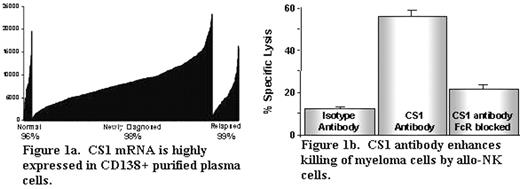Abstract
Introduction: One-third of multiple myeloma (MM) patients exhibit high-risk features such as abnormal cytogenetics, high LDH, amplification of CKS1-B or spiked expression of MAF, MAF-B or FGFR3. While not affecting complete response rates, median durations of event-free and overall survival, even with high-dose melphalan-based tandem autotransplants of such patients, do not exceed 24 mo and 36 mo, compared to 60 mo and ≥ 90 mo for the remainder. Monoclonal antibody (mAb)-mediated therapy may target a chemotherapy-resistant myeloma cell pool. CS1 (CD2 subset 1, CRACC, SLAMF7), a member of the CD2 family of cell surface glycoproteins, exhibits high-level expression on primary myeloma cells, indicating that CS1 is a potential target for treatment in MM.
Methods: Gene expression was assessed using an Affymetrix GeneChip array. Protein expression was measured by flow cytometry, and immunohistochemistry (IHC), using HuLuc63, a novel humanized anti-CS1 mAb. HuLuc63-mediated lysis of myeloma cells via antibody dependent cellular cytotoxicity (ADCC) was measured by 51Cr-release.
Results: CS1 mRNA was detected in >95% of CD138+ purified plasma cells from >95% of healthy donors, newly diagnosed myeloma patients, and those with relapsed myeloma (Fig. 1a). CS1 remained highly expressed in patients following VDTPACE treatment, albeit at a reduced level. CS1 expression was also high following bortezomib (Velcade®) treatment, with a subset of patients showing increased expression post-treatment. CS1 protein expression on primary myeloma cells was confirmed by flow cytometry, while IHC analysis of normal tissues revealed anti-CS1 staining primarily on CD138+ tissue plasma cells. Finally, we determined that HuLuc63 could induce killing of myeloma cells using purified allogeneic NK cells (Fig. 1b). Blocking the Fc receptor greatly reduced this activity indicating an ADCC mechanism. Killing of myeloma targets was also observed in autologous systems suggesting that HuLuc63 can overcome KIR-mediated NK cell inhibition of autologous NK cells. In summary, we observed high mRNA and protein expression of CS1 in myeloma from early stage, late stage, and treated patients, and showed enhanced lysis of myeloma cells in vitro with HuLuc63. Our data support the potential clinical utility of CS1-targeted therapy. HuLuc63 will be entering a phase I clinical trial for advanced myeloma patients.
CS1 mRNA is highly expressed in CD138+ purified plasa cells.
CS1 mRNA is highly expressed in CD138+ purified plasa cells.
CS1 antibody enhances killing of myeloma cells by allo - NK cells.
CS1 antibody enhances killing of myeloma cells by allo - NK cells.
Disclosures: This research was supported by a grant from Protein Design Labs.; This research was supported by a grant from Protein Design Labs.
Author notes
Corresponding author


This feature is available to Subscribers Only
Sign In or Create an Account Close Modal